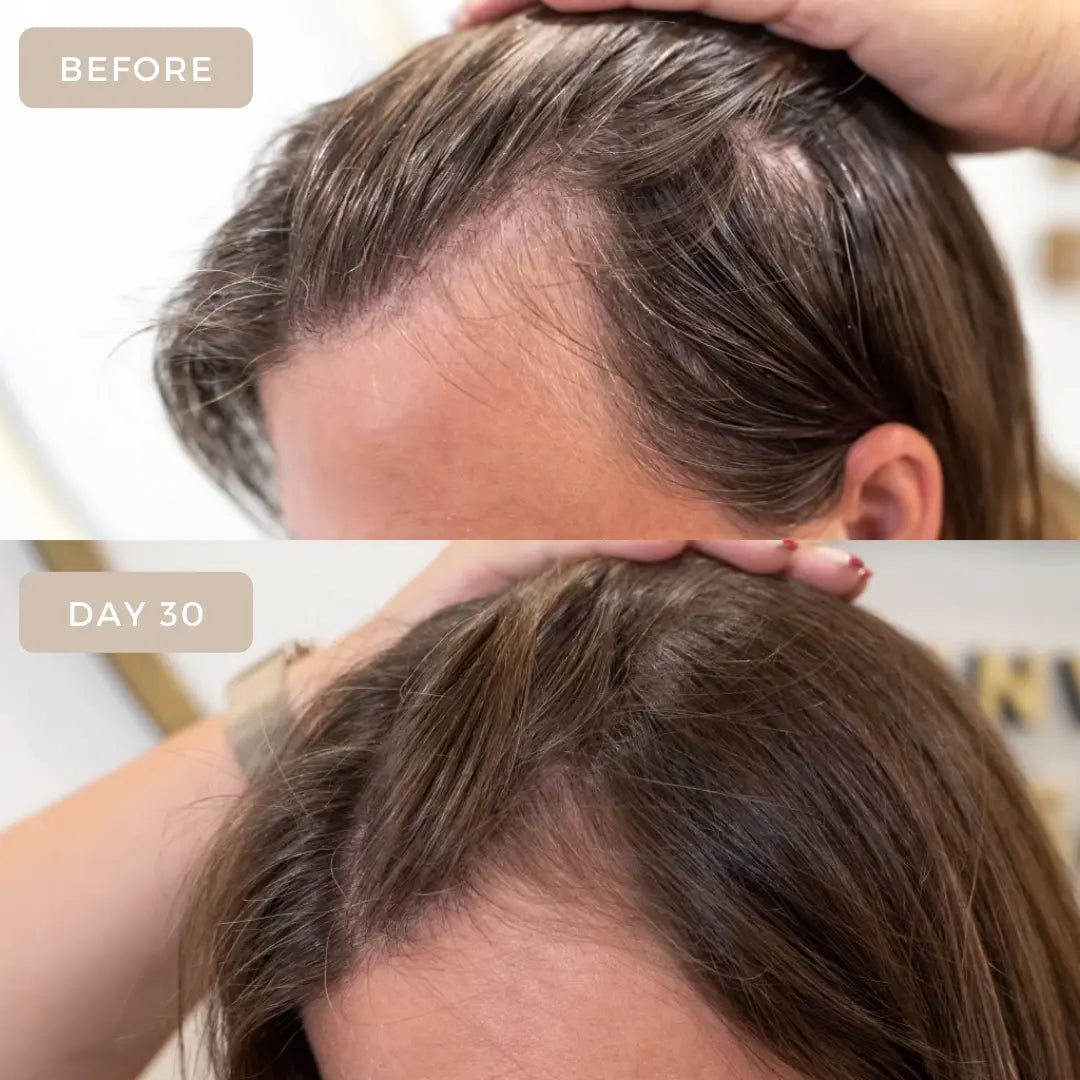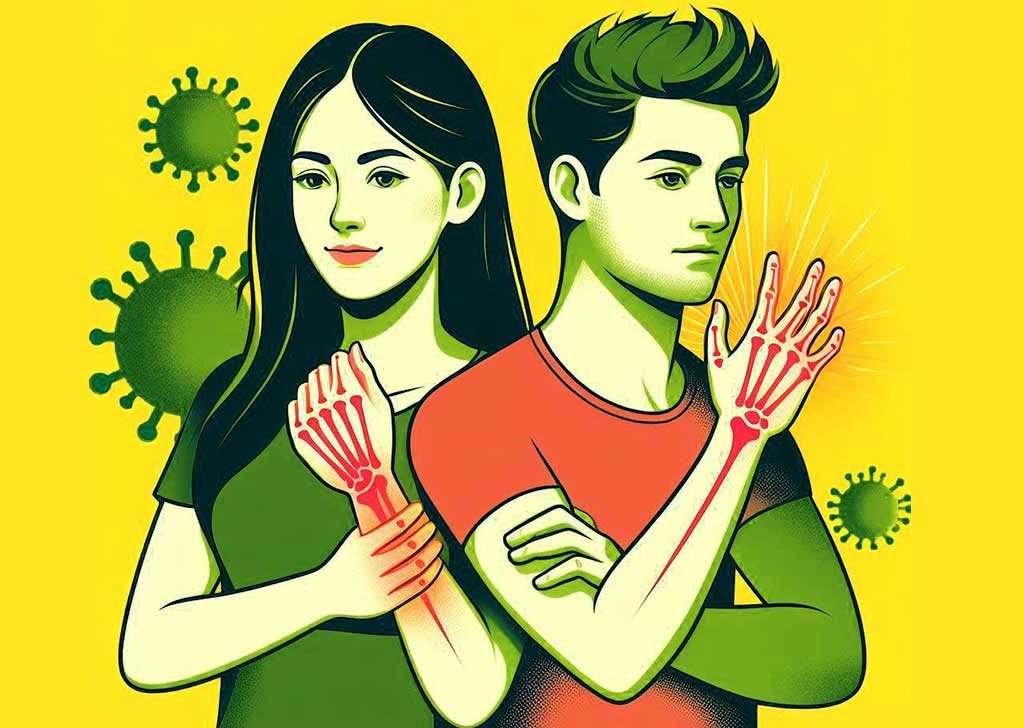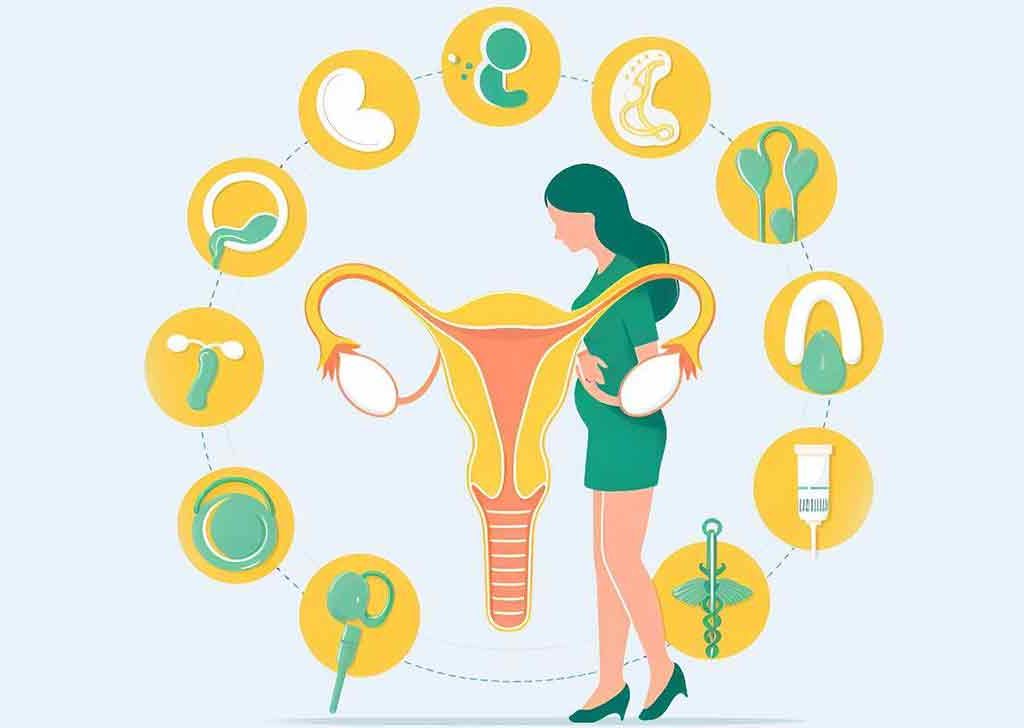Hair loss can feel overwhelming, especially when you’re not sure what’s causing it. Is it something in your genes, or could it be the stress of everyday life taking its toll?
If you’ve found yourself staring at your hairbrush or the shower drain, wondering why you’re shedding more than usual, you’re not alone. Understanding the root cause is the first step to finding the right solution. We’ll help you figure out whether your hair loss is genetic or stress-related.
You’ll learn the key signs to watch for and how to take control of your hair health. Don’t let uncertainty keep you guessing—keep reading to get the answers you need and feel more confident about your next steps.

Signs Of Genetic Hair Loss
Hair loss can feel like a mystery, but certain signs can help you figure out whether it’s in your genes. Genetic hair loss, or androgenetic alopecia, follows specific patterns and often runs in families. By understanding these clues, you can take the right steps to manage and treat it effectively.
Patterns Of Hair Thinning
Genetic hair loss often starts in predictable areas. For men, it’s common to notice a receding hairline or thinning at the crown. Women may experience thinning along the part or a general reduction in hair density at the top of the scalp.
Pay attention to how your hair loss progresses. Is it happening in specific spots, or does it feel more random? Genetic hair loss usually follows a steady, gradual pattern, unlike stress-related shedding, which can seem sudden and widespread.
Family History Clues
Your family tree can provide important hints. Did your parents, grandparents, or siblings experience similar hair loss? If so, there’s a good chance your hair loss could be genetic.
Look for patterns in your relatives. For instance, if your dad or uncles developed bald spots in their 30s or 40s, you might see similar changes around the same age. Knowing your family history can help you spot potential signs early.
Common Age Of Onset
Genetic hair loss doesn’t usually appear overnight. It tends to start in your late teens to early 20s for men and in your 30s or later for women. If you notice gradual thinning during these age ranges, it could be a sign.
Stress-related hair loss, on the other hand, can happen at any time and often follows a significant life event. Ask yourself: Is your hair loss tied to a particular phase of life, or is it connected to recent stressors? Age can be a big clue in determining the cause.
Understanding these signs can make a real difference in how you approach your hair care routine. If you suspect your hair loss is genetic, consulting a dermatologist or trichologist early can help you take control. Do you see any of these signs in your own hair journey?
Stress-related Hair Loss Indicators
Hair loss can be worrying, especially when you’re not sure what’s causing it. Stress is one of the most common reasons people notice sudden changes in their hair. But how do you spot the signs of stress-related hair loss? Let’s break it down so you can pinpoint if stress is the culprit.
Sudden Hair Shedding
One clear indicator of stress-related hair loss is unexpected shedding. You might notice extra strands on your pillow, in the shower, or caught in your brush. The difference? Stress-related shedding often happens quickly, within weeks of a stressful event.
Think about your recent life. Did something major happen that left you feeling overwhelmed? If yes, your hair might be reacting to the pressure. Telogen effluvium, a type of stress-induced hair loss, pushes hair into the shedding phase prematurely.
Don’t panic—this type of shedding is usually temporary. Once the stress levels drop, your hair growth often resumes its normal cycle.
Patchy Hair Loss
If you’ve noticed small bald spots or thinning patches, stress might be playing a role. This condition, known as alopecia areata, can be triggered by intense emotional or physical strain. It’s different from genetic hair loss, which tends to spread evenly or follow a predictable pattern.
Do you see areas where hair is completely missing? These patches can appear suddenly and might even be accompanied by itching or tenderness. While this can feel alarming, addressing stress and seeking professional help can often slow or reverse the process.
Pay attention to these patches. They’re a sign your body might need a break from relentless stress.
Connection To Life Events
Stress-related hair loss often ties back to specific moments in your life. Did you recently move, lose a job, or experience a significant health issue? If yes, this could explain the changes in your hair.
Your body responds to stress by shifting energy away from non-essential functions, like hair growth. Think of it as your body prioritizing survival over appearance.
Reflect on your timeline. Did hair loss begin shortly after a big change? Pinpointing the cause can help you manage stress and take steps to encourage regrowth.
Stress-related hair loss doesn’t have to be permanent. By recognizing these indicators and addressing the root cause, you can often restore your hair and your peace of mind. So, what steps will you take to tackle stress and care for your hair today?
Key Differences Between Genetic And Stress Hair Loss
If you’re noticing more hair in your brush or clogging the shower drain, you might wonder: Is this genetic hair loss or stress-related? The two types often get confused, but they’re very different in how they manifest and progress. Understanding the key differences can help you determine the root cause and take the right steps toward treatment.
Progression Patterns
Genetic hair loss, like male or female pattern baldness, typically progresses slowly over time. You might see a receding hairline, thinning at the crown, or widening of the part. These changes usually follow a predictable pattern and won’t resolve without intervention.
Stress-related hair loss, on the other hand, often comes on suddenly. Hair might shed in clumps or diffuse thinning could appear all over your scalp. The good news? Once the stressor is resolved, your hair often grows back within months.
Physical Symptoms
Genetic hair loss generally doesn’t cause physical discomfort. You won’t feel any itching or pain—it’s more about the visible changes. The hair follicles simply shrink over time, leading to thinner and shorter strands.
Stress-induced hair loss, like telogen effluvium, might come with some noticeable symptoms. Your scalp could feel itchy, tender, or even tingly. These sensations often go hand-in-hand with the emotional toll of stress, making the condition even more frustrating.
Scalp Conditions
With genetic hair loss, your scalp usually looks normal and healthy. There’s no redness, flaking, or inflammation associated with this type of hair shedding. It’s the gradual shrinking of hair follicles that leads to hair loss, not an underlying scalp issue.
Stress-related hair loss might present differently. If you’re dealing with stress, you could notice more dandruff or an oily scalp. These changes are often tied to hormonal shifts or poor scalp care during high-stress periods. Keeping your scalp clean and nourished can help minimize further issues.
So, what’s your next step? Pay close attention to these patterns, symptoms, and scalp conditions. The better you understand the signs, the more prepared you’ll be to tackle the root cause of your hair loss.

Credit: goldielocks.com
When To Seek Professional Advice
Hair loss can be a distressing experience, especially when you’re unsure of the underlying cause. Is it stress-induced, or is it in your genes? While some hair loss is temporary and resolves on its own, certain signs may point to a deeper issue that requires expert help. Knowing when to seek professional advice can make a big difference in addressing the problem early and effectively.
Signs That Require Medical Attention
Not all hair loss is created equal. If you notice sudden or patchy hair loss, it’s worth getting checked. This could be linked to conditions like alopecia areata or even autoimmune diseases.
Excessive shedding after combing or washing your hair may also be a red flag. If your scalp feels itchy, inflamed, or you see unusual redness, it’s time to act. These symptoms often indicate an issue beyond normal hair fall.
Pay attention to whether the hair loss is accompanied by other changes in your body. For example, thinning eyebrows, unexpected weight gain or loss, or fatigue could signal hormonal imbalances or nutritional deficiencies.
Types Of Specialists To Consult
The type of specialist you consult depends on the suspected cause of your hair loss. A dermatologist is often your first stop for scalp and hair concerns. They can identify skin conditions or hereditary factors causing hair loss.
If stress or anxiety is a likely trigger, a psychologist or psychiatrist might be helpful. Stress-induced hair loss, like telogen effluvium, often resolves once the stress is managed.
For suspected hormonal or thyroid issues, consider seeing an endocrinologist. They specialize in conditions that can affect your hair, like hypothyroidism or PCOS.
Diagnostic Tests And Procedures
To pinpoint the cause of your hair loss, your doctor may suggest a few diagnostic tests. A scalp biopsy, for instance, can reveal whether your hair follicles are healthy or compromised by conditions like alopecia areata.
Blood tests are another common tool. They can check for deficiencies in iron, vitamin D, or other essential nutrients, as well as thyroid or hormonal imbalances that might be contributing to your hair loss.
In some cases, a pull test may be performed. This involves gently pulling on small sections of hair to see how much comes out, helping your doctor assess the severity and pattern of your hair loss.
Are you noticing signs that feel out of the ordinary? Don’t wait to get answers. The earlier you consult a professional, the better your chances of finding an effective solution to restore your confidence and hair health.
Effective Treatments For Genetic Hair Loss
Hair loss caused by genetics can be distressing, but effective treatments exist. Understanding these options can help you manage and improve hair health. From medications to lifestyle changes, there are ways to address genetic hair loss.
Medications And Topical Solutions
Medications like Minoxidil and Finasteride are common treatments for genetic hair loss. Minoxidil, a topical solution, stimulates hair growth and slows thinning. Finasteride, an oral medication, blocks hormones linked to hair loss. Both are FDA-approved and widely used.
Topical solutions containing caffeine or biotin may also support hair health. Some shampoos and serums can strengthen hair and improve scalp condition. Consult a dermatologist before starting any medication or topical treatment.
Hair Transplant Options
Hair transplants are effective for advanced genetic hair loss. This procedure moves healthy hair follicles to thinning or bald areas. Techniques like Follicular Unit Transplantation (FUT) and Follicular Unit Extraction (FUE) are commonly used.
Hair transplants provide natural-looking results but can be costly. Recovery time varies depending on the method used. Discuss your goals and options with a certified hair transplant specialist.
Lifestyle Adjustments
Improving your lifestyle can support overall hair health. Eating nutrient-rich foods like leafy greens, nuts, and fish can strengthen hair. Staying hydrated also helps maintain scalp health.
Stress management is key, as stress can worsen genetic hair loss. Regular exercise, meditation, or hobbies can reduce stress levels. Avoid smoking and limit alcohol intake for better hair and scalp condition.
Managing Stress To Prevent Hair Loss
Hair loss can be a stressful experience for anyone. While genetic factors play a role, stress can also trigger hair loss. Managing stress is crucial to maintaining healthy hair and reducing excessive shedding. By incorporating simple stress-management techniques into your routine, you can support your overall well-being and help prevent hair-related issues.
Stress-reduction Techniques
Practicing relaxation techniques can help control stress levels. Deep breathing exercises are a simple way to calm the mind. Meditation and yoga also promote mental balance and relaxation. Regular physical activity, like walking or cycling, can reduce stress hormones. Setting aside time for hobbies you enjoy is another great way to unwind.
Diet And Nutrition Tips
Your diet has a direct impact on your hair health. Include foods rich in vitamins and minerals, like leafy greens, nuts, and eggs. Vitamin D and iron deficiencies can contribute to hair loss. Stay hydrated by drinking plenty of water throughout the day. Limit processed foods and sugary snacks, as they can increase stress levels.
Building Healthy Habits
Getting enough sleep is essential for stress management. Aim for seven to eight hours of quality sleep every night. Establish a consistent sleep schedule to improve rest. Avoid overloading yourself with tasks and learn to delegate. Organizing your day and setting realistic goals can reduce daily stress. Taking short breaks during work helps maintain focus and lowers anxiety.
Common Myths About Hair Loss
Hair loss can be distressing, leading many to seek answers. Unfortunately, myths about hair loss often create confusion. Misconceptions can prevent people from understanding its true causes. Here, we break down common myths and share valuable insights.
Debunking Popular Misconceptions
One common myth is that wearing hats causes hair loss. This is false. Hats do not affect your hair follicles or scalp health. Hair loss is usually related to genetics, hormones, or stress.
Another myth is that frequent shampooing leads to hair loss. Washing your hair does not cause permanent hair shedding. It only removes the hair strands already detached from your scalp.
People often believe cutting hair makes it thicker. Hair thickness is determined by the follicles, not the length. Cutting hair does not change the diameter or density.
Facts About Hair Regrowth
Hair regrowth depends on the cause of hair loss. Genetic hair loss often requires medical treatments or therapies. Stress-related hair loss may improve over time with lifestyle changes.
Hair follicles in genetic hair loss shrink and stop producing new strands. Stress-related loss usually involves temporary follicle disruption. Once stress decreases, regrowth may occur naturally.
Regrowth can take weeks or months, depending on individual health. Eating a balanced diet and staying hydrated helps support healthy hair regrowth.
Role Of Hair Care Products
Hair care products cannot reverse genetic hair loss. They may help improve scalp health and hair appearance. Products with nourishing ingredients can strengthen existing strands.
Avoid harsh chemicals in shampoos and conditioners. These can weaken hair and irritate the scalp. Choose products designed for your hair type and concerns.
Some treatments, like minoxidil, are FDA-approved for certain types of hair loss. Consult a dermatologist before using any medical-grade product.
Credit: www.belgraviacentre.com

Credit: sons.co.uk
Frequently Asked Questions
Is My Hair Loss From Stress Or Genetics?
Hair loss can result from stress or genetics. Stress-related hair loss is usually temporary, while genetic hair loss is hereditary and progressive. Consulting a dermatologist can help identify the cause accurately.
How Do I Know If My Hair Loss Is Genetic?
Genetic hair loss often shows gradual thinning, a receding hairline, or balding patterns. Consult a dermatologist for confirmation.
Can You Stop Balding If You Catch It Early?
Catching balding early can help slow or stop hair loss with treatments like medication, lifestyle changes, or specialized therapies.
Can Pattern Hair Loss Grow Back?
Pattern hair loss is usually permanent, but treatments like minoxidil, finasteride, or hair transplants may promote regrowth.
Read more our previous post for: Stress Leave / Does Homework Cause Stress / Hema Contact Lens / Dr Contact Lens Promo Code / Marlo Contact Lens / trust issues / Mini Tummy Tuck / Newborn Baby Weight / 16-Week Ultrasound / Diabetes Care for Early stage / Metformin for Diabetes / Mattress for Arthritis / Affordable Healthcare / U.S. Healthcare / Sleep Deprived / Endometriosis Surgery Recovery Time
you can check: Fertility Calculator / BMI Calculator / BMR Calculator / Health Risks Calculator / Mental Health Hospital Quotes on Mental Health / Vanicream Vitamin C / Plastic Surgery Center / Vitamin D3 for Sexually
Read More: Ashwagandha Can Make You Horny / Vaginal Pump / Omron Blood Pressure / Vitamin C in Daily / vitamin D deficiency / magic wash laundromat / amphound / pixelxoom / cake ideas
Read More: vaginal depth / Vaginal Pump / Vaginal Cuff / Vaginal Dryness / Tighten Your Vagina / Sore Penis After Sex / Nicotine and Your Sex Drive / Why am I so horny? / Sexual Battery
Read more: 8 oz Chicken Breast / Sea Moss Gel / V8 Energy Drinks / 3 eggs calories / Eating Masago
Conclusion
Understanding the cause of hair loss is essential for addressing it effectively. Genetic hair loss often follows patterns, while stress-related loss may happen suddenly. Pay attention to symptoms like thinning, shedding, or receding hairlines. Consulting a dermatologist can provide clarity and personalized advice.
Early action can make a big difference in managing the issue. Remember, maintaining a healthy lifestyle supports overall hair health. Stay informed and listen to your body’s signals. Recognizing the root cause is the first step toward finding the right solution.
Healthy habits and expert guidance can help you regain confidence in your hair.



